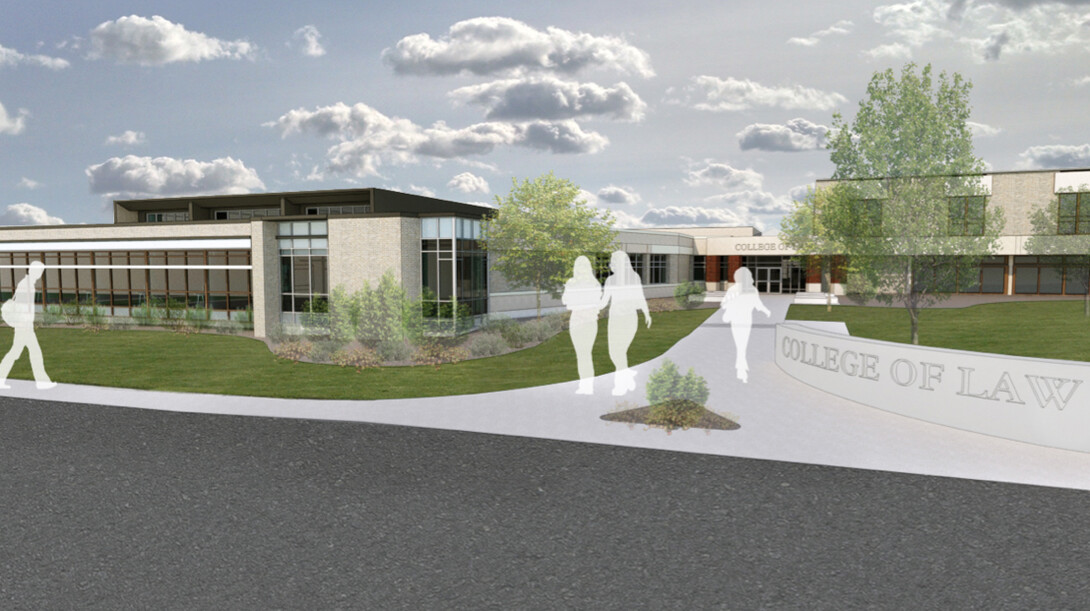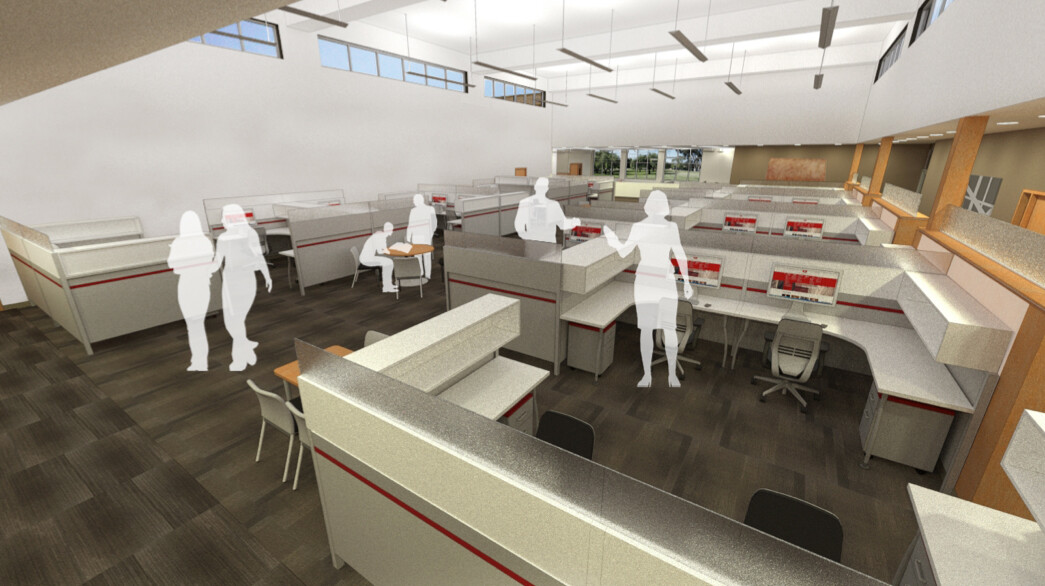
A $4.5 million addition to the University of Nebraska College of Law to open in fall 2016 will literally move the college’s clinical programs front and center.
The 14,000-square-foot addition, to house the college’s four legal clinics and allow for potential expansion of those programs, will be located adjacent to Law College’s main entrance, on the south side of Ross McCollum Hall. A groundbreaking ceremony is scheduled for 4:30 p.m. April 10.
Legal clinics, which give law students hands-on experience serving real-world clients, are an increasingly important part of legal education in a tight job market, said Susan Poser, dean of the college of law. They also teach students how valuable and gratifying it is to provide critical legal assistance to underserved clients.
The new location will provide easy access for clients seeking legal assistance and will stress the importance of experiential learning at the college, Poser said.
“We’re sending a message about skills training at the law school,” she said. “We’re making sure that students who want that kind of practical experience can get it.”
Kevin Ruser, M.S. Hevelone Professor of Law and director of clinical programs, said the college’s new clinical space will be second to none.
“It’s more important than ever to have a strong, experiential learning opportunity for students,” he said. “I’ll put this space up against any other place in the country.”
Though expansion plans remain under discussion, the addition will allow “more than adequate” room for Nebraska’s clinics to grow, he said.
Poser said two donors, Esther Beynon of Colorado Springs, Colo., and Dennis Weibling of Seattle, were instrumental in making the project a reality. Beynon donated $1 million to the effort in honor of her father, Ira Beynon, a 1919 Nebraska Law graduate. Weibling, a Seattle attorney who graduated from Nebraska’s law-psychology program, contributed $1 million via a matching grant that generated an additional $1 million from other donors. Poser said several other donors made contributions of $100,000 to $250,000.
Weibling, who plans to attend the April 10 event, said he feels passionate that students should get a taste of practicing law before they graduate. Though Weibling did not participate in a clinic as a student, he recalled his own positive experience as a young attorney first using his education to help clients.
“It just brought such life to the law,” he said. “If I could have had that earlier, it would have created more enthusiasm and direction for my studies.”
The college of law offers four legal clinics – the Civil Clinic, Criminal Clinic, Immigration Clinic and Entrepreneurship Clinic, with 32 third-year law students accepted to participate in one of the four each semester.
The programs are in demand, with more students seeking to enroll each semester than slots available. The clinics also have waiting lists for clients.
The Entrepreneurship Clinic, for example, has served 70 clients since it was established in 2013, director Brett Stohs said. Another 58 potential clients are on a waiting list.
Yet the clinics are housed in fragmented spaces that have seen few updates in recent years. The Entrepreneurship Clinic is in a cramped basement suite of offices, with barely enough room for its eight students to work at one time.
Criminal clinic director Steven Schmidt borrows classrooms to teach an intense 30-hour training course during the first three weeks of the semester before his students report to the Lancaster County Attorney’s Office to begin prosecuting misdemeanors and felonies.
The 16 students who participate in the civil and immigration clinics each semester are housed in quarters that haven’t been updated since the mid-1980s. The space was not designed with computers in mind and requires heavy use of extension cords to meet the technology demands of a modern law practice.
“The only part of our building that has not been renovated during the past 15 years is the clinic,” Poser said. “It was noted during a 2011 American Bar Association reaccreditation visit that the space didn’t seem adequate to serve clients.”
Yet, in light of a sharp nationwide decline in law school enrollments that began in 2011, there seemed little could be done to remedy the situation.
An unsolicited $1 million check from Beynon, mailed to Poser in 2012, allowed “us to begin to dream,” Poser said.
Designed by The Clark Enersen Partners, the new space will feature a reception area for clients, private interview rooms to consult with clients, conference rooms and a mock courtroom. A classroom and faculty offices will allow the four clinic directors to better coordinate teaching.
Desk space in a large open area will accommodate up to 40 law students, allowing them to trade ideas and consult on strategy without waiving attorney-client privilege.
Clients can arrive for appointments through an entrance directly off the college’s main foyer without wandering the hallways looking for an office in the basement or at the far side of the building.
“It will give students a better sense of what it would be like to be in a law firm,” Poser said. “It’s a very professional space.”








